Analysis
Copier Careers 2018 Service Technician Salary Survey

It’s a good time to be a copier technician, because tech skills are in very high demand. The need for qualified hybrid technicians has increased steadily over the past decade as the Copier Channel turned into a largely IT and networked technology business. While there are never enough top technicians to go around, this year the shortage is particularly acute. “Scarcity is making techs an increasingly valuable commodity,” said Paul Schwartz, president of Copier Careers.
This year’s Technician Salary Survey confirms what many dealers already know: Qualified techs are in short supply, and many are actively exploring their options. Half of survey respondents say they are “dissatisfied” or “very dissatisfied” with all aspects of their job, and nearly three-quarters say they are “actively” or “somewhat” looking for a new job, which mirrors national trends in IT staffing. But Copier Careers recruiters say there are ways to attract or retain techs in this red-hot market.
The 2018 Copier Technician Salary Survey
This is the 16th year that Copier Careers, the only nationwide recruiting firm dedicated exclusively to the Copier Channel, has asked professionals from across the industry about their compensation, job satisfaction and work-life issues. This year 4,740 copier techs from across the industry participated in our survey, an increase of 106 respondents from 2017.
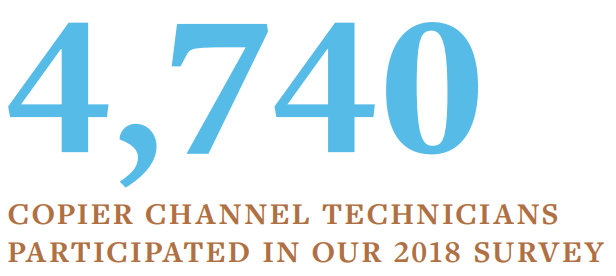
“Intense.” That’s how Jessica Crowley, business development manager and senior recruiter at Copier Careers, describes the recruiting scene for service technicians. “Candidates know that it’s their market out there, and they have options.”
This year’s online survey generated responses from 4,740 copier service technicians, nearly three-quarters of whom said they are ready to move on, and it’s not only about salary but a combination of increased pay, access to training and other benefits.
Seventy-two percent of those who took the survey said they are “actively” or “somewhat” looking for a new job, an increase of 1 percent over 2017. At the same time, 50 percent of respondents said they are “dissatisfied” or “very dissatisfied” with all aspects of their job. Taken together, that creates a critical mass of techs moving toward new opportunities.
Even though the average base salary and bonuses increased in 2018, copier techs are looking outward. “They want something better,” Crowley said. “They want to see a difference from what they are experiencing in their current role.”
Techs said the most attractive opportunities and benefits — after salary — include working with leading technology at a company that understands IT and having the tools to do the job well. This evolving wish list is creating pressure for recruiters and dealers alike. It’s a new dynamic that will require Copier Channel dealers to adjust their sights, Schwartz said.
“They have to make realistic offers to candidates,” he said. “Doing lateral transitions, moving someone over for a similar compensation package, more than likely isn’t going to work anymore.”
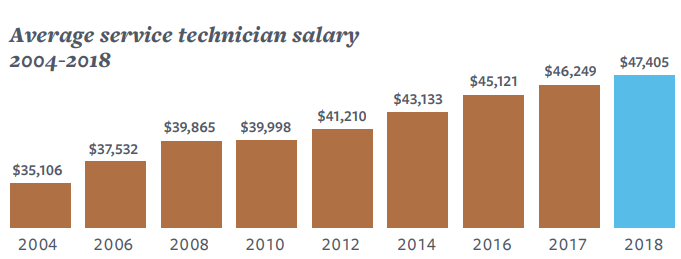
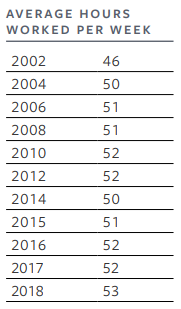
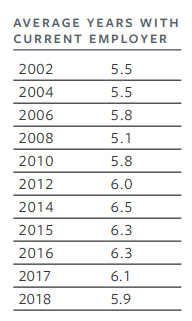
Copier Techs by the Numbers
Overall, the service technician pool is a bit younger this year; on average a technician is just over 33 years old and has worked in the Copier Channel for 6.8 years.
Over the past decade, the average age of techs has fallen 3.8 years, or 10.3 percent. This decline in the average age of techs might be a harbinger of other changes facing industry leaders as expectations and work styles evolve.
Educational achievement did not change from a year ago: 49 percent have a high school diploma, 13 percent some college, 23 percent OEM training, 15 percent tech or trade school and 0.5 percent an associate’s degree.
Nearly two-thirds of technicians (63 percent) describe themselves as field service techs, 35 percent identify as senior lead techs or team leaders and 2 percent of respondents described their job as house technician.
On average, copier techs work 53 hours per week, an increase of one hour over 2017. They reported spending an additional seven hours each week on-call after hours — also a one-hour increase over what they reported in 2017.
In 2018, 24 percent of copier technicians were women, a slight decrease from 2017, when women composed 25 percent of respondents. This reflects the national trend in the tech field, where women now hold 26 percent of jobs.
As the pool of techs trends younger and somewhat more female, addressing their work-style preferences will change the workplace. In the survey, “working in a team setting” and “working with leading-edge technology” were up 62 points and 11 points, respectively, which is a large change from past surveys.
Overall, techs want their pay to reflect market demand and how they have adapted their problem-solving skills and trouble-shooting work in the age of IT solutions. Employers need to address these factors to help their company attract qualified candidates.
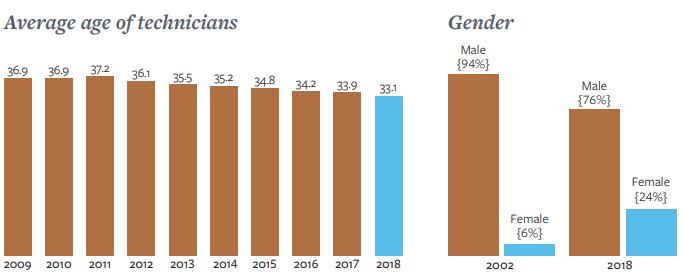
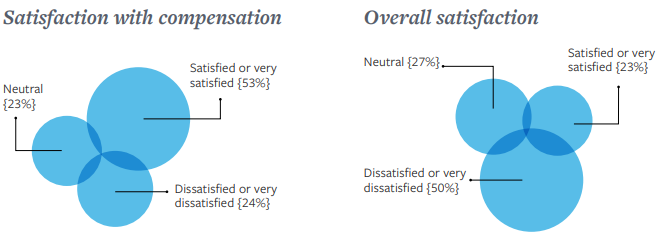
2018 Salary and Benefits
Copier techs reported that on average their salary and bonuses increased to $47,405 and $6,305 respectively in the past year —an increase of 2.6 percent. The top non-cash indirect rewards remained the same as last year:
- 99 percent received health benefits and were reimbursed for certification expenses
- 91 percent report their company paid for further education and training
- 82 percent receive a company car or car allowance
- 27 percent were reimbursed for tuition
Bonuses were up slightly this year, which might indicate that dealers are trying to sweeten deals to attract or retain copier techs. Of those responding to the survey, 81 percent received retention bonuses, up 3 percent; 69 percent were given bonuses for personal performance, up 1 percent; and 54 percent received a signing bonus, up 3 percent.
In 2018, respondents’ satisfaction with compensation declined 2 percentage points to 53 percent, while there was a corresponding increase of 2 points to 24 percent of those who were dissatisfied. Those neutral on this topic held steady at 23 percent. On the issue of overall satisfaction, half of techs said they were dissatisfied or very dissatisfied, 23 percent were satisfied and 27 percent were neutral. Decreased satisfaction overall and on compensation might indicate higher salary expectations in the tight market.
“Technicians are rarely compensated for what they bring to the table,” a tech said. “Most companies compensate based on arbitrary data such as number of times a month to the same machine. Techs should be compensated for being able to prevent calls.”

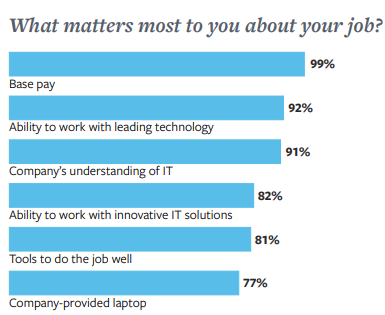
The 2018 survey indicates a significant shift about what matters most to copier techs at work — and what doesn’t matter. From a list of 38 work factors, they were asked to choose the seven things they value most at work.
As in last year’s survey, compensation was No. 1, with 99 percent of techs identifying it as the top thing on their list (chart above). Other factors rose in importance to techs over the past year, most notably:
- 71 percent want to feel a sense of community in their work, an increase of 62 percentage points
- 69 percent see their success tied to the effectiveness of their immediate supervisor, an increase of 8 points
- 37 percent want to wear more causal clothing to work, an increase of 4 points over last year
In what also might be an expression of growing confidence in their marketability, techs expressed less interest in job stability. Only 71 percent saw it as something that matters most, a decrease of 5 percentage points from last year. There was also a slight decrease in those who are concerned about the prestige of the company, with only 51 percent seeing it as important. Techs also showed little interest in working for a startup, telecommuting and on-site child care (chart below).
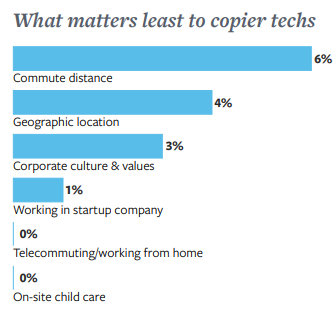
“I had been with my old company for almost 22 years. But the environment had become so toxic that being pursued and valued made perfect sense, even at 55 years old.”
In 2018, 72 percent of copier techs who took our survey said they are looking for a new job because of opportunities too good to pass up and better compensation. They also offered a roadmap to their ideal workplace. It would:
- Offer competitive pay
- Understand the importance of IT and offer the opportunity to work with leading-edge technology
- Give techs the tools and support they need to do their job well
- Recognize work well done and value the opinions and knowledge of staff
- Foster a sense of community within work groups
- Offer skill development and education/training opportunities
- Acknowledge that their opinions and knowledge are valued
It is also clear that many techs, even those with long tenure at a company, are open to new opportunities. One hybrid tech reported that he recently updated his resume, was quickly recruited and took a new job that was too good to pass up.
“A recruiter put me with my current employer at a higher pay rate, better working conditions and incentives for raises,” he said. “I had been with my old company for almost 22 years. But the environment had become so toxic that being pursued and valued made perfect sense, even at 55 years old.”
With abundant options, techs aren’t going to wait around. “Anytime you’re dealing with a limited commodity, you have to move decisively to make a good hire,” Schwartz said. “Dealers need to understand that the candidate might have been interviewing with other companies, so the compensation plan needs to be aggressive in order for them to fully commit to moving forward.”
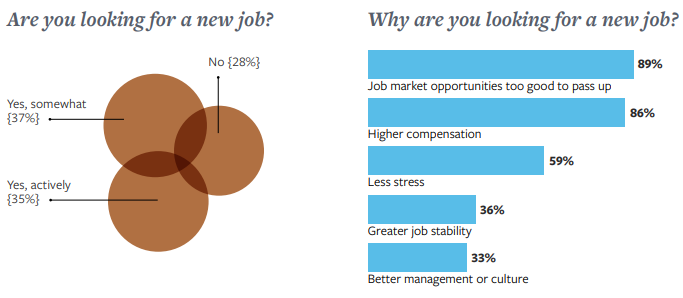
Dealers need techs with more sophisticated skills, and techs expect to be compensated for their increased expertise.
An Expanding Need for IT Skills
As technology and solutions have advanced, the Copier Channel has evolved from a safe business niche to a dynamic, energetic industry with a need for a tech workforce with strong IT skills. That growth has changed expectations. Dealers need techs with more sophisticated skills, and techs expect to be compensated for their increased expertise.
“Dealers need to add tech skills to survive, and they need to compensate like IT providers to survive,” Schwartz said. “It’s another reason for companies to partner with us to find the most talented, skilled people out there, or they can’t operate their businesses.
“It’s really incumbent upon us to educate our clients that all of this is going on,” he said. “If they want to make an offer, it has to have certain elements to make it a better circumstance for the individual. Financial reasons are a big piece of it.”
In addition, companies need to improve their game at attracting candidates. Seventy-nine percent of survey respondents said their company is “poor” or “totally unsatisfactory” at attracting talent. But in retaining staff, 57 percent gave their company a positive rating. As the industry works to address the need for skilled techs, it also will have to create a more collaborative, team-style work “community,” to attract a new generation of techs who prefer a more collaborative workplace.
“The industry is going to have to adjust to that environment, if they don’t have it already, to attract those younger people with strong IT skills,” Crowley said.
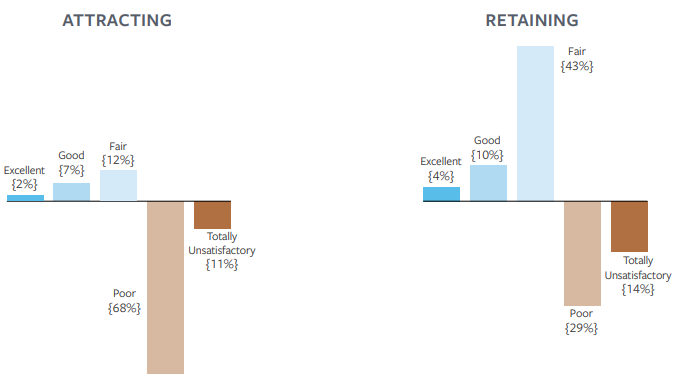
“If you take your time and are not being responsive to the candidate, they’ll find something else, or they will stay where they are.”
Signpost: More Growth and Adapting Ahead
Recruiting and hiring in a tight market isn’t impossible, but it might feel that way at times. In a speeded-up industry, many companies have grown cautious in hiring, because bringing the wrong person aboard can affect everything from morale to client relationships and profits. Right now, the instinct to see more candidates and consider all options might be the wrong instinct.
“Depending on who is in the pipeline, we tend to find someone the first time,” Schwartz said of most recruiting efforts. “But when we do, companies need to move on it. If you take your time and are not being responsive to the candidate, they’ll find something else, or they will stay where they are.”
In 2018, that is the reality of trying to find and hire hybrid service techs. Companies are offering salary increases of up to 10 percent to attract new hires and are making counteroffers to retain techs. But Schwartz and Crowley said accepting a counteroffer can backfire for technicians. “If you are ready to move on, do it,” Schwartz advised. “The minute you accept a counteroffer, you have a target on your back. Remember, there’s a reason you went looking for a new position in the first place.”
Counteroffers are rarely a long-term solution for employers, either. Employees who accept a counteroffer often leave or are let go within a year. “They’ve communicated that their future may be elsewhere; most employers will perceive them as disloyal,” he said.
An employer’s real target should be finding the right candidates for the growing number of opportunities in the industry and the right position for every hybrid tech. “This isn’t really a time of scarcity, it’s a time of dynamic growth that can be a win-win for dealers and techs alike,” he said. “It’s like the old saying ‘a rising tide lifts all boats.’ A tide of growth is lifting the copier industry, and it’s a good thing for everyone, even if there are some growing pains.”
How to navigate the rising tide? The best advice is to embrace it. “The No. 1 thing I tell our clients is that the time frame from the interview to the offer stage should be as short as possible,” Crowley said. “Communicate your expectations, and keep the process moving to keep candidates interested.”
As the Copier Channel continues to grow and evolve, so too will the need for professionals with sophisticated technical skills. The industry’s proven ability to adapt to changing times is exactly what it needs now to find, train and reward the skilled techs who will sustain its momentum. -CC
Stay Tuned for Our Other 2018 Salary Surveys
- July Sales Managers Salary Survey
- August Service & Operations Managers Salary Survey
- December Sales Representatives Salary Survey
ABOUT US
Copier Careers® is a recruiting firm dedicated exclusively to helping Copier Channel employers find experienced service techs, copier sales reps, sales managers, service & operations managers, controllers, back-office staff and MPS/MNS experts. Learn more about our commitment to the Copier Channel at CopierCareers.com or call 888-733-4868 to talk with a recruiter.
